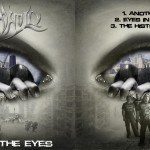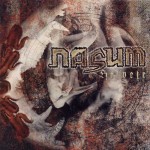What are Sadistic Metal Reviews? The only path to metal glory is to make music that is metal both in form and content, and upholds the spirit of conquering the unknown and crushing the empty and pointless. Anything else fails and shall be mocked! Come for the impotent rage, stay for the occasional standout…
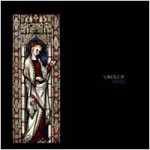 Vrolok – Void (The Divine Abortion)
Vrolok – Void (The Divine Abortion)
After taking much, much too long to get started (by the way, the ‘tension building’ here is hitting an open E chord for 2 minutes), the first proper track begins with a drum beat that I’d expect to hear from GZA or Del Tha Funkee Homosapian. It only gets worse from there. This album sounds like someone took Burzum, Strid, xanax, and nu-metal and threw them all into a blender. The downright hilarious vocals are just as laugh-inducing as Nattramn of Silencer, and the bass drums sound like bongos. The tracks that aren’t overly long suffer from a lack of direction, and end much too suddenly. What a mess. No wonder this band has gotten much more exposure, they have all of the ‘eeevol’ ingredients that make their music sound scary to the tweenies, but to the experienced listener this is like hearing a group of circus monkeys play Aske.
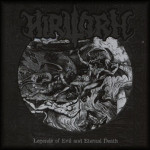 Hirilorn – Legends of Evil and Eternal Death
Hirilorn – Legends of Evil and Eternal Death
As black metal became awash in a sea of imitators, distinguish quality grew difficult due to the sheer number of bands that were releasing albums in the post-1996 entropic period of black metal. Thus it is refreshing to discover a release from that time with spirit and wonder in its construction. Hirilorn’s first and only album is that kind of release.
In a similar fashion to Enslaved’s classic Vikingligr Veldi, this album consists of lengthy songs with subtle harmonies and adventurous structures. Unlike Enslaved, however, Hirilorn are a power metal hybrid but not in such a way that sabotages direction in their music. A particularly outstanding element is the lead guitar, which often plays variations on the melodies of the main riffs throughout the song. It is very much in the forefront of the mix, which is quite unusual for black metal, but here the melodies are evocative and compelling, so this approach works. Vocals are a consistent mid ranged shriek, but occasionally clean vocals are used (such as in “Through The Moonless Night”). Though they are a bit shaky, the result is similar to listening to Quorthon’s singing; it’s not very ‘good’ but it is honest and therefore has a distinct charm.
Where this album succeeds is in creating a world to journey to; these songs tell stories which one can envision easily upon several close listens. It is performed well, ambitious, and seeks to create something new from black metal’s framework. Its failures are a tendency to be overlong and as a result this album feels unfinished at times. Still, this is an interesting work which is a definite highlight of the creatively uninspired late 1990s period of black metal.
Once you strip away all the layers of other aesthetic, this is metalcore of the melodic “death metal” type, like a hybrid between The Haunted and Dark Sanctuary, which is essentially very basic heavy metal with reliance on too much unison between vocal rhythms and guitars. Good metal leads with guitars and vocals follow, because that allows the most expression; bad metal sets up a vocal rhythm to make people feel comfortable and has guitars echo it, which ends up sounding like a TV commercial.
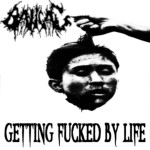 Ballgag – Getting Fucked by Life
Ballgag – Getting Fucked by Life
Extremely middle of the road grindcore. It’s hard to screw up grindcore, since there are no rules. This band keep their songs compact, balance between punkish open rhythms and grinding riffs that crunch momentum. Vocals are incomprehensible which makes all of this into one uniform texture. It’s both quality and unexceptional. Maybe drop the pretentious name and try to be a Napalm Death style grind band. Essentially, there’s raw material here that could be good and more importantly, the will to pare down songs so that they’re not random, but the band are unwilling to choose a direction. The nonsense shock name and nonsense shock album title are clues here, but even more so is the utter middle-of-the-road choices the band makes in tempo and riff that obscure its contributions. Refocusing this band would involve a lot more guts and probably a great deal more glory than this innocuous release will garner.
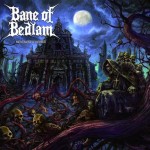 Bane of Bedlam – Monument of Horror
Bane of Bedlam – Monument of Horror
This strong band is divided between trying to be 1980s speed metal and attempting to fit 2010s “modern metal” into that framework. The verses are rhythmic, single-chord muted strum playing with quick turnaround fills. Choruses use melodic guitar riffs and more expansive patterns to create a sense of space. Unfortunately the vocals tend to influence the music, both by forcing metalcore/post-hardcore guitar-chasing-the-vocals riff-writing and vocalizations of the emphatic type that modern metal uses, where the vocal rants out a beat and then relies on lengthy decay for the last few iterations. Waa waa waa, waa waa, waa waa waaaaaaaaaaaahhhhh. This in turn drives drums to play a catch-up role. The result is that this band’s strength in riffing and song assembly is buried under poor choices. They integrate radical contrast riffs into these songs like a 1980s speed metal band, and while they don’t do as many dynamic shifts in rhythm, they know how to avoid hammering a trope into the ground as well. If this band wants to get ahead, it’s time to drop the modern metal vocals and influences and focus on finding a unique voice in 1980s-style speed metal. Otherwise they’re going to get lost in the modern metal morass, which is producing ten times as many bands as it can sell, and find itself offering the same thing others do without being fully trendy and modernized.
If you’re someone that is just getting into grindcore, it’s easy to see why this release might appeal to you. It’s got a pretty good handle on riffcraft, good dueling vocals, coherent songs, and is very punk in spirit adn approach. However, Helvete quickly loses its luster. The songs are incredibly simple to the point where one can guess what will happen in most by hearing the first few seconds. It also gets too groovy (moronically so), throwing out a lot of the actual grind for this.
The fact that it is very punky is another shortcoming; a lot of this music is just that — hardcore punk with some blast beats and nu-metal inspired groove — with very little actual grind to be found. What is left is aesthetic only and that tires quickly. Many do not wish to give this band bad reviews on account of the tragically unfortunate death of the singer/mainman, but it would be an insult to the artist to not grade this honestly: a C/C+ at best. If one is really interested in this band, their first album and the material before it are much more compelling, but you could always just listen to Discordance Axis or Blood instead. Turd chunder.
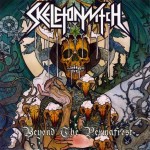 Skeletonwitch – Beyond the Permafrost
Skeletonwitch – Beyond the Permafrost
This is like the soundtrack to some pimply-faced kid wherein he imagines beating up the bullies and emerging victorious; except he never actually does this and continues to get beat up because he’s a wimp. That’s what this album sounds like. Retreat into a fantasy world that is incongruent with reality, dress it up with some weak black metal shrieking and Gothenburg riffs, rinse and repeat. It’s no wonder this stuff’s so popular – it hits all of the right marks to endear it to the mall going young teen demographic. None of these riffs even sound menacing, most are major scale based. So you get weird happy sounding riffs in music that is trying to sound evil. This band even labels themselves ‘thrash’…..well if this is thrash then I’m the new leader of the DPRK. Someone call the US government to let them know we have new suitable music for torturing prisoners in Guantanamo.
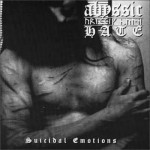 Abyssic Hate – Suicidal Emotions
Abyssic Hate – Suicidal Emotions
When bands claim direct inspiration from one other band in particular, one must approach this description with caution. Does said band actually take techniques/methods of their influences and incorporate them into new song structures? Or does said band merely try to sound as close to their influences as possible? For this album, it’s the latter.
There are some truly excellent, somber riff passages here. The problem is that instead of building up to a conclusion (such as in Burzum or Graveland, the two biggest influences on this recording) Abyssic Hate just drone on in repetition of the aesthetic influence. Three of these tracks could have had several minutes shaved off of each and they’d be no worse for the wear. The shortest track is the most complete, but that is only by virtue of it not being as overly repetitive as the longer tracks can be. If this group could develop its sharp riffcraft into more adventurous song structures, we’d be looking at something interesting. It doesn’t, so the end result is something that is atmospherically soothing, even a little eerie, but after a few minutes that wears off and you’re left with the sounds of a radiator buzzing for 40 more minutes.
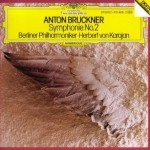 Anton Bruckner – Symphony No. 2 (Herbert von Karajan, Berlin Philharmonic Orchestra, 1981)
Anton Bruckner – Symphony No. 2 (Herbert von Karajan, Berlin Philharmonic Orchestra, 1981)
Artists who produce great and powerful bodies of work leave behind less-noticed works that are by no means lesser. Bruckner’s Symphony No. 2 is actually his fourth symphonic work, and is relentlessly overshadowed by his more intense symphonies such as the lengthy and crushing Eighth, which produces a pervasive sense of inexorable conflict and restless destructive renewal.
The Second on the other hand builds quietly from a nearly pastoral origin to a peaceful state of mind that then like a dragon rising from the mist turns to fire and warfare in the tumultuous and restive finale. Beginning with a gentle interweaving of naturalistic themes, the first movement assembles them in a style not dissimilar to the riff sequencing of Celtic Frost or Incantation, a type of prismatic construction that excels in placing repetitive in sequences interrupted from within such that each recurrence is a return with new knowledge to a familiar theme and thus an expansion instead of a reiteration. These build to the two middle movements which reflect more of an inner state of mind, in which melodies are carefully organized into a developing sequence which shows balance and harmony. Expert organ improviser Bruckner shows his true power here in his approach to the sonic tapestry where resonant sequences gradually alter themselves and through negative space and absence generate a higher intensity of presence. These techniques expanded with his later symphonies but can be seen in a lighter application here as part of a focused series of techniques.
The finale rotates between nascent versions of several triumphant melodies, bringing each one out of primordial chaos so that it can develop, then detouring to another, then returning, so that these melodies complement each other and explode in a triumphant final martial processional followed by a meditative recapitulation of the mood and theme of the earlier movements. The result is a breathtaking dynamic that shatters not just expectations but the intractable egoism of humanity that renders them closed to the inherent adventure of life itself.
Listening to Bruckner always reminds me of the secret of life that hides in plain sight. These immersive and epic symphonies etch out a clue that all of life is pervaded with meaning and holiness, and we deny it only to feel “in control” which is nothing but pretense. I don’t care what religious tradition you come from, or even a negation of religion, because you can access this sentiment through any viewpoint. It is simply this: life is an intricate and balanced design of great beauty and thus, truth, and through this we learn why we endure, and even more, why we strive.
This outlook is always just below the surface of all that we perceive, but it hides from us, because we must be open to it to see what is potential, and thus, what is immanently real. Although most people choose death and control over being part of the great complex beauty that breathes incessantly around them, Bruckner reminds us that the option is always there to lose ourselves and gain a cosmos.
12 CommentsTags: abyssic hate, anton bruckner, ballgag, bane of bedlam, hirilorn, nasum, sadistic metal reviews, skeletonwich, stormhold, vrolok

